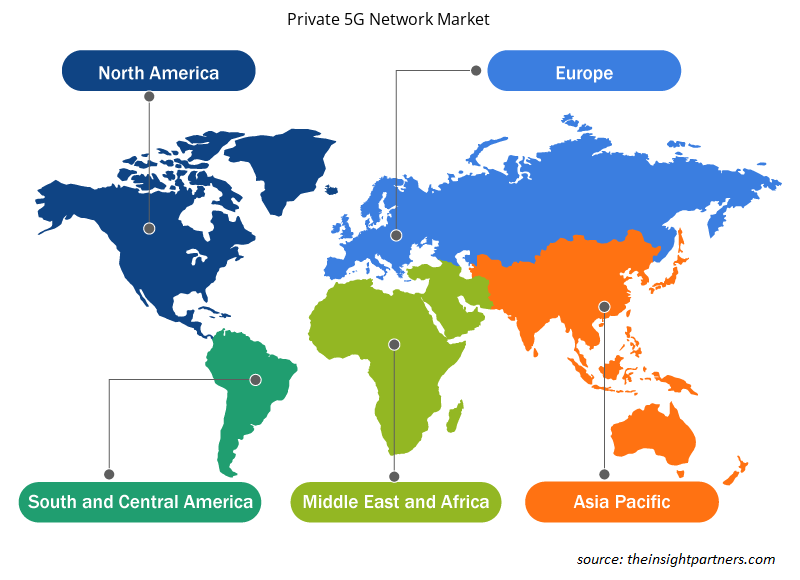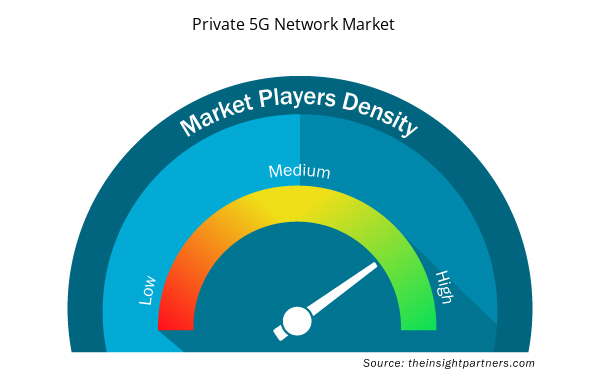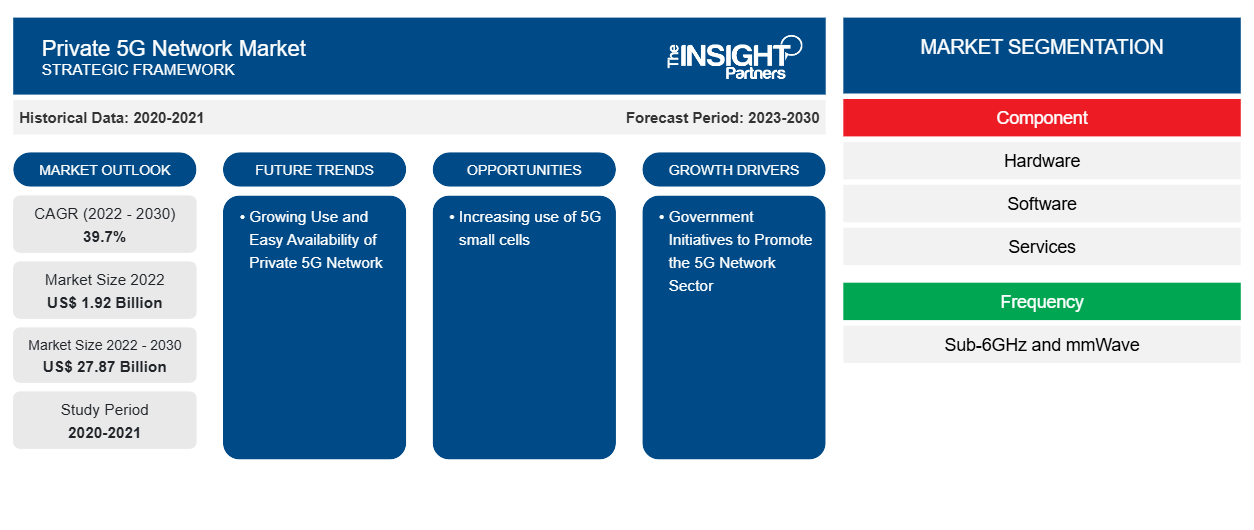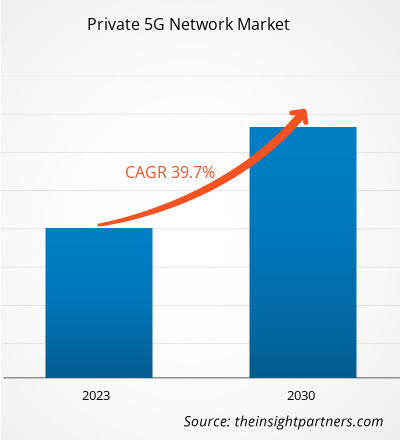Der Markt für private 5G-Netzwerke soll von 1,92 Milliarden US-Dollar im Jahr 2022 auf 27,87 Milliarden US-Dollar im Jahr 2030 anwachsen. Der Markt wird zwischen 2022 und 2030 voraussichtlich eine durchschnittliche jährliche Wachstumsrate von 39,7 % verzeichnen. Die zunehmende Nutzung von 5G-Kleinzellen dürfte ein wichtiger Trend auf dem Markt bleiben.
Marktanalyse für private 5G-Netzwerke
Die zunehmende Nutzung und einfache Verfügbarkeit privater 5G-Netzwerke sowie die steigende Nachfrage nach IoT treiben den Markt an. Aufgrund der zunehmenden Digitalisierung in Unternehmen wird erwartet, dass der Markt im Prognosezeitraum wachsen wird. Darüber hinaus schaffen staatliche Initiativen zur Förderung des 5G-Netzwerksektors und der zunehmende Einsatz zeitkritischer Netzwerke in der Automobilindustrie lukrative Möglichkeiten für den Markt.
Marktübersicht für private 5G-Netzwerke
Ein privates 5G-Netzwerk ist ein dediziertes lokales Netzwerk (LAN), das die Internetkonnektivität für Unternehmen, Industrie und andere Benutzer erweitert. Es wird erwartet, dass Netzwerkdienste der nächsten Generation mit ihrer Entwicklung den Bedarf an wichtiger drahtloser Kommunikation für die öffentliche Sicherheit, Industriebetriebe und die Konnektivität kritischer Infrastrukturen decken werden. Darüber hinaus wird der globale Markt vor allem durch die wachsende Nachfrage nach ultrazuverlässigen Verbindungen mit geringer Latenz für Anwendungen des industriellen Internets der Dinge (IoT) wie Roboter, kollaborative Industriekameras, Industriekameras und Industriesensoren angetrieben.
Passen Sie diesen Bericht Ihren Anforderungen an
Sie erhalten kostenlos individuelle Anpassungen an jedem Bericht, einschließlich Teilen dieses Berichts oder einer Analyse auf Länderebene, eines Excel-Datenpakets sowie tolle Angebote und Rabatte für Start-ups und Universitäten.
- Holen Sie sich die wichtigsten Markttrends aus diesem Bericht.Dieses KOSTENLOSE Beispiel umfasst eine Datenanalyse von Markttrends bis hin zu Schätzungen und Prognosen.
Treiber und Chancen auf dem privaten 5G-Netzwerkmarkt
Zunehmende Nutzung und leichte Verfügbarkeit privater 5G-Netze begünstigen den Markt
Mehrere Unternehmen starten Initiativen, um die Nutzung privater 5G-Netze zu fördern. So kündigte Siemens im September 2023 die offene Verfügbarkeit seiner privaten 5G-Infrastruktur für industrielle Netzwerke in Deutschland an, der ursprünglichen Heimat von Industrie 4.0. Darüber hinaus wurde ein Unternehmen namens IS-Wireless ausgewählt, um privates 5G für Industrie 4.0 in Deutschland bereitzustellen. Das Konsortium Campus DynA, zu dem deutsche Industriegiganten wie Gestalt Robotics, T-Systems, OSRAM, Fraunhofer und das Werner-von-Siemens-Zentrum für Industrie und Wissenschaft gehören, hat IS-Wireless als Anbieter des 5G-Netzes basierend auf dem Open RAN-Konzept ausgewählt.
Regierungsinitiativen zur Förderung des 5G-Netzwerksektors
Die kanadische Regierung fördert den privaten 5G-Netzsektor. So hat die kanadische Bundesregierung im Mai 2023 über Innovation, Science, and Economic Development Canada (ISED) einen neuen Satz von Kriterien für die Frequenzlizenzierung herausgegeben und damit private 5G-Netze in Kanada zugelassen. Darüber hinaus wird das private 5G-Netz vor allem in der Bergbauindustrie genutzt. So wird beispielsweise im September 2023 die Goldmine Detour Lake im Nordosten Ontarios voraussichtlich von neuen Technologien wie Fernbohrungen und fahrerlosen Fahrzeugen profitieren, dank eines im Vorjahr in Zusammenarbeit mit Rogers entwickelten privaten 5G-Netzes. Unterstützende staatliche Maßnahmen und die zunehmende Nutzung privater 5G-Netze treiben also die Branche an.
Segmentierungsanalyse des Marktberichts für private 5G-Netzwerke
Wichtige Segmente, die zur Ableitung der Marktanalyse für private 5G-Netzwerke beigetragen haben , sind Komponente, Frequenz und Endbenutzer.
- Basierend auf den Komponenten ist der Markt für private 5G-Netzwerke in Hardware, Software und Dienste unterteilt. Das Hardwaresegment hatte im Jahr 2022 einen größeren Marktanteil.
- Auf der Grundlage der Frequenz ist der Markt in Sub-6GHz und mmWave unterteilt. Das Sub-6GHz-Segment hatte im Jahr 2022 einen größeren Marktanteil.
- In Bezug auf die Endverbraucher ist der Markt in Fertigung, Energie und Versorgung, Automobil, Militär und Verteidigung, Regierung und öffentliche Sicherheit und andere unterteilt. Das Fertigungssegment hatte im Jahr 2022 einen größeren Marktanteil.
Private 5G-Netzwerk-Marktanteilsanalyse nach Geografie
Der geografische Umfang des Marktberichts für private 5G-Netzwerke ist hauptsächlich in fünf Regionen unterteilt: Nordamerika, Asien-Pazifik, Europa, Naher Osten und Afrika sowie Süd- und Mittelamerika.
Der Markt in Europa wird im Prognosezeitraum voraussichtlich wachsen. Großbritannien ist eine der am schnellsten wachsenden Volkswirtschaften der Welt. Es verzeichnet ein erhebliches Wachstum im Bereich der privaten 5G-Netzwerke. So startete Vodafone im Juni 2023 das erste 5G SA-Netzwerk für Verbraucher in Großbritannien. Zum Start war das 5G SA in großen britischen Städten wie London, Manchester, Glasgow und Cardiff verfügbar. Unter dem kommerziellen Namen Vodafone 5G Ultra verspricht der Betreiber eine bessere Konnektivität in belebten Gebieten, höhere Geschwindigkeiten und eine längere Akkulaufzeit. Vodafone und ITN setzten 5G-Slicing während der Live-Berichterstattung von der Krönung Karls III. ein. Darüber hinaus vergab der Basingstoke and Deane Borough Council im November 2021 an Cellnex UK einen Auftrag zur Entwicklung und Installation eines privaten 5G-Netzwerks in Basing View, dem zentralen Geschäftsviertel von Basingstoke, das aus einem 5G-Kern besteht. Das zentrale Geschäftsviertel von Basingstoke umfasst ein 5G-Kernnetz und ein Funkzugangsnetz. Da mehrere Unternehmen in das private 5G-Netzwerk investieren, wächst der Markt in Großbritannien.
Regionale Einblicke in den privaten 5G-Netzwerkmarkt
Die regionalen Trends und Faktoren, die den privaten 5G-Netzwerkmarkt während des gesamten Prognosezeitraums beeinflussen, wurden von den Analysten von Insight Partners ausführlich erläutert. In diesem Abschnitt werden auch die Marktsegmente und die Geografie privater 5G-Netzwerke in Nordamerika, Europa, im asiatisch-pazifischen Raum, im Nahen Osten und Afrika sowie in Süd- und Mittelamerika erörtert.

- Holen Sie sich die regionalspezifischen Daten für den privaten 5G-Netzwerkmarkt
Umfang des Marktberichts zum privaten 5G-Netzwerk
| Berichtsattribut | Details |
|---|---|
| Marktgröße im Jahr 2022 | 1,92 Milliarden US-Dollar |
| Marktgröße bis 2030 | 27,87 Milliarden US-Dollar |
| Globale CAGR (2022 - 2030) | 39,7 % |
| Historische Daten | 2020-2021 |
| Prognosezeitraum | 2023–2030 |
| Abgedeckte Segmente | Nach Komponente
|
| Abgedeckte Regionen und Länder | Nordamerika
|
| Marktführer und wichtige Unternehmensprofile |
|
Marktteilnehmerdichte: Der Einfluss auf die Geschäftsdynamik
Der Markt für private 5G-Netzwerke wächst rasant, angetrieben durch die steigende Nachfrage der Endnutzer aufgrund von Faktoren wie sich entwickelnden Verbraucherpräferenzen, technologischen Fortschritten und einem größeren Bewusstsein für die Vorteile des Produkts. Mit steigender Nachfrage erweitern Unternehmen ihr Angebot, entwickeln Innovationen, um die Bedürfnisse der Verbraucher zu erfüllen, und nutzen neue Trends, was das Marktwachstum weiter ankurbelt.
Die Marktteilnehmerdichte bezieht sich auf die Verteilung von Firmen oder Unternehmen, die in einem bestimmten Markt oder einer bestimmten Branche tätig sind. Sie gibt an, wie viele Wettbewerber (Marktteilnehmer) in einem bestimmten Marktraum im Verhältnis zu seiner Größe oder seinem gesamten Marktwert präsent sind.
Die wichtigsten Unternehmen auf dem Markt für private 5G-Netzwerke sind:
- Cisco Systems Inc
- Huawei Technologies Co Ltd
- Nokia Corp
- Telefonaktiebolaget LM Ericsson
- T-Systems International GmbH
- Verizon Communications Inc
Haftungsausschluss : Die oben aufgeführten Unternehmen sind nicht in einer bestimmten Reihenfolge aufgeführt.

- Überblick über die wichtigsten Akteure auf dem privaten 5G-Netzwerkmarkt
Nachrichten und aktuelle Entwicklungen zum privaten 5G-Netzwerkmarkt
Der private 5G-Netzwerkmarkt wird durch die Erfassung qualitativer und quantitativer Daten nach Primär- und Sekundärforschung bewertet, die wichtige Unternehmensveröffentlichungen, Verbandsdaten und Datenbanken umfasst. Einige der Entwicklungen auf dem privaten 5G-Netzwerkmarkt sind unten aufgeführt:
- Nokia hat die Einführung des Nokia DAC PW Compact angekündigt, einer neuen Konfiguration, die auf die privaten drahtlosen Konnektivitätsanforderungen kleiner und mittlerer Industriestandorte optimiert ist. Da immer mehr Branchen zur Verbesserung ihrer Geschäftsprozesse auf die digitale Transformation umsteigen, bietet eine kompakte Version der marktführenden privaten drahtlosen Lösung von Nokia strenge Sicherheit und zuverlässige Konnektivität, die sicherstellt, dass selbst die kleinsten Unternehmensstandorte vom Übergang profitieren können. (Quelle: Nokia Corp, Unternehmenswebsite, Oktober 2023)
- AT&T Mexiko holt neue Partner in sein 5G-Innovationslabor, um Anwendungsfälle für private Netzwerke zu entwickeln. In Zusammenarbeit mit Qualcomm, Celona, Axity und Veea hat das Unternehmen mit der technologischen Erprobung privater Netzwerke im 5G-Innovationslabor begonnen, das AT&T in Mexiko-Stadt angesiedelt hat. (Quelle: AT&T Inc., Unternehmenswebsite, April 2023)
Marktbericht zum privaten 5G-Netzwerk: Abdeckung und Ergebnisse
Der Bericht „Marktgröße und Prognose für private 5G-Netzwerke (2020–2030)“ bietet eine detaillierte Analyse des Marktes, die die folgenden Bereiche abdeckt:
- Marktgröße und Prognose für private 5G-Netzwerke auf globaler, regionaler und Länderebene für alle wichtigen Marktsegmente, die im Rahmen des Berichts abgedeckt sind
- Markttrends für private 5G-Netzwerke sowie Marktdynamiken wie Treiber, Einschränkungen und wichtige Chancen
- Detaillierte PEST/Porters Five Forces- und SWOT-Analyse
- Marktanalyse für private 5G-Netzwerke mit Blick auf wichtige Markttrends, globale und regionale Rahmenbedingungen, wichtige Akteure, Vorschriften und aktuelle Marktentwicklungen
- Branchenlandschaft und Wettbewerbsanalyse, einschließlich Marktkonzentration, Heatmap-Analyse, prominenten Akteuren und aktuellen Entwicklungen für den privaten 5G-Netzwerkmarkt
- Detaillierte Firmenprofile
- Historische Analyse (2 Jahre), Basisjahr, Prognose (7 Jahre) mit CAGR
- PEST- und SWOT-Analyse
- Marktgröße Wert/Volumen – Global, Regional, Land
- Branche und Wettbewerbsumfeld
- Excel-Datensatz



Report Coverage
Revenue forecast, Company Analysis, Industry landscape, Growth factors, and Trends

Segment Covered
This text is related
to segments covered.

Regional Scope
North America, Europe, Asia Pacific, Middle East & Africa, South & Central America

Country Scope
This text is related
to country scope.
Häufig gestellte Fragen
The global private 5G network market is estimated to register a CAGR of 39.7% during the forecast period 2022–2030.
The global private 5G network market is expected to reach US$ 27.87 billion by 2030.
Europe dominated the private 5G network market in 2022.
Growing use and easy availability of private 5G networks and increasing demand for IoT are the major factors that propel the global private 5G network market.
Increasing use of 5G small cells to play a significant role in the global private 5G network market in the coming years.
The key players holding majority shares in the global private 5G network market are Cisco Systems Inc, Huawei Technologies Co Ltd, Nokia Corp, Telefonaktiebolaget LM Ericsson, T-Systems International GmbH, Verizon Communications Inc, Vodafone Group Plc, AT&T Inc, Qualcomm Inc, and Amazon Web Services Inc.
Trends and growth analysis reports related to Technology, Media and Telecommunications : READ MORE..
The List of Companies - Private 5G Network Market
- AT&T Inc.
- Cisco Systems, Inc.
- Huawei Technologies Co., Ltd.
- Nokia
- Telefonaktiebolaget LM Ericsson
- T-Systems International GmbH
- Amazon.com, Inc.
- Qualcomm Technologies, Inc.
- Verizon
- Vodafone Limited
The Insight Partners performs research in 4 major stages: Data Collection & Secondary Research, Primary Research, Data Analysis and Data Triangulation & Final Review.
- Data Collection and Secondary Research:
As a market research and consulting firm operating from a decade, we have published and advised several client across the globe. First step for any study will start with an assessment of currently available data and insights from existing reports. Further, historical and current market information is collected from Investor Presentations, Annual Reports, SEC Filings, etc., and other information related to company’s performance and market positioning are gathered from Paid Databases (Factiva, Hoovers, and Reuters) and various other publications available in public domain.
Several associations trade associates, technical forums, institutes, societies and organization are accessed to gain technical as well as market related insights through their publications such as research papers, blogs and press releases related to the studies are referred to get cues about the market. Further, white papers, journals, magazines, and other news articles published in last 3 years are scrutinized and analyzed to understand the current market trends.
- Primary Research:
The primarily interview analysis comprise of data obtained from industry participants interview and answers to survey questions gathered by in-house primary team.
For primary research, interviews are conducted with industry experts/CEOs/Marketing Managers/VPs/Subject Matter Experts from both demand and supply side to get a 360-degree view of the market. The primary team conducts several interviews based on the complexity of the markets to understand the various market trends and dynamics which makes research more credible and precise.
A typical research interview fulfils the following functions:
- Provides first-hand information on the market size, market trends, growth trends, competitive landscape, and outlook
- Validates and strengthens in-house secondary research findings
- Develops the analysis team’s expertise and market understanding
Primary research involves email interactions and telephone interviews for each market, category, segment, and sub-segment across geographies. The participants who typically take part in such a process include, but are not limited to:
- Industry participants: VPs, business development managers, market intelligence managers and national sales managers
- Outside experts: Valuation experts, research analysts and key opinion leaders specializing in the electronics and semiconductor industry.
Below is the breakup of our primary respondents by company, designation, and region:

Once we receive the confirmation from primary research sources or primary respondents, we finalize the base year market estimation and forecast the data as per the macroeconomic and microeconomic factors assessed during data collection.
- Data Analysis:
Once data is validated through both secondary as well as primary respondents, we finalize the market estimations by hypothesis formulation and factor analysis at regional and country level.
- Macro-Economic Factor Analysis:
We analyse macroeconomic indicators such the gross domestic product (GDP), increase in the demand for goods and services across industries, technological advancement, regional economic growth, governmental policies, the influence of COVID-19, PEST analysis, and other aspects. This analysis aids in setting benchmarks for various nations/regions and approximating market splits. Additionally, the general trend of the aforementioned components aid in determining the market's development possibilities.
- Country Level Data:
Various factors that are especially aligned to the country are taken into account to determine the market size for a certain area and country, including the presence of vendors, such as headquarters and offices, the country's GDP, demand patterns, and industry growth. To comprehend the market dynamics for the nation, a number of growth variables, inhibitors, application areas, and current market trends are researched. The aforementioned elements aid in determining the country's overall market's growth potential.
- Company Profile:
The “Table of Contents” is formulated by listing and analyzing more than 25 - 30 companies operating in the market ecosystem across geographies. However, we profile only 10 companies as a standard practice in our syndicate reports. These 10 companies comprise leading, emerging, and regional players. Nonetheless, our analysis is not restricted to the 10 listed companies, we also analyze other companies present in the market to develop a holistic view and understand the prevailing trends. The “Company Profiles” section in the report covers key facts, business description, products & services, financial information, SWOT analysis, and key developments. The financial information presented is extracted from the annual reports and official documents of the publicly listed companies. Upon collecting the information for the sections of respective companies, we verify them via various primary sources and then compile the data in respective company profiles. The company level information helps us in deriving the base number as well as in forecasting the market size.
- Developing Base Number:
Aggregation of sales statistics (2020-2022) and macro-economic factor, and other secondary and primary research insights are utilized to arrive at base number and related market shares for 2022. The data gaps are identified in this step and relevant market data is analyzed, collected from paid primary interviews or databases. On finalizing the base year market size, forecasts are developed on the basis of macro-economic, industry and market growth factors and company level analysis.
- Data Triangulation and Final Review:
The market findings and base year market size calculations are validated from supply as well as demand side. Demand side validations are based on macro-economic factor analysis and benchmarks for respective regions and countries. In case of supply side validations, revenues of major companies are estimated (in case not available) based on industry benchmark, approximate number of employees, product portfolio, and primary interviews revenues are gathered. Further revenue from target product/service segment is assessed to avoid overshooting of market statistics. In case of heavy deviations between supply and demand side values, all thes steps are repeated to achieve synchronization.
We follow an iterative model, wherein we share our research findings with Subject Matter Experts (SME’s) and Key Opinion Leaders (KOLs) until consensus view of the market is not formulated – this model negates any drastic deviation in the opinions of experts. Only validated and universally acceptable research findings are quoted in our reports.
We have important check points that we use to validate our research findings – which we call – data triangulation, where we validate the information, we generate from secondary sources with primary interviews and then we re-validate with our internal data bases and Subject matter experts. This comprehensive model enables us to deliver high quality, reliable data in shortest possible time.


 Holen Sie sich ein kostenloses Muster für diesen Bericht
Holen Sie sich ein kostenloses Muster für diesen Bericht